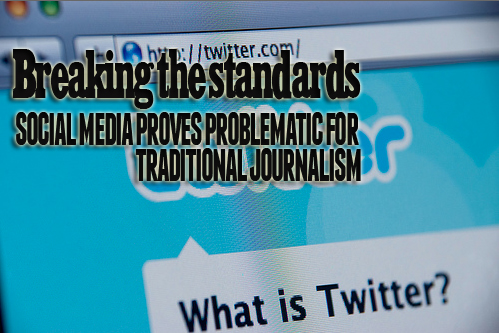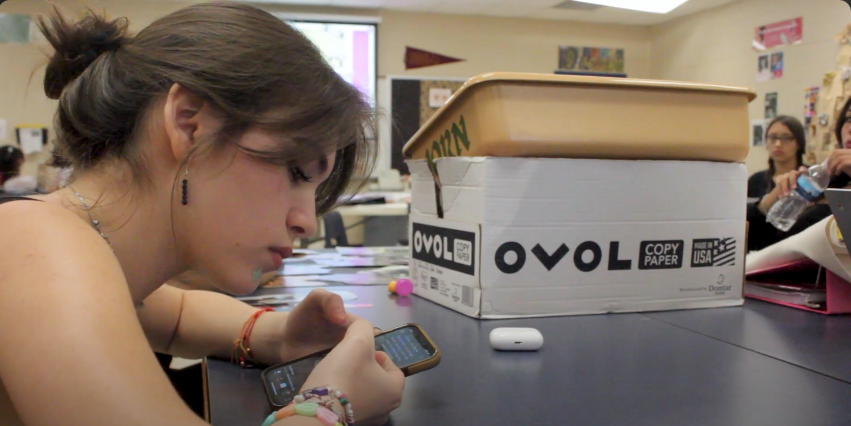by Emily Moore | Photo Editor , Natalie Allen | Arts & Entertainment Editor, and Victoria Rivera | Staff Photographer
Pick up a daily newspaper – say, a Tuesday edition – and the thinness of the pages is startling. Once a relied-upon community forum and a premium destination for advertising revenue, the long-revered daily newspaper has taken a backseat to social media – particularly with younger generations accustomed to immediacy and accessibility.

Over the years, social media has climbed to the top of the web food-chain and instilled itself to many as a direct source for information; rendering the journalistic style of introducing news-worthy information somewhat useless. This type of thinking, and delegating influence, has had a subtle, yet profound effect on the way we look at journalism.
“Yeah, the paper is getting thinner and thinner each day because everything is moving to computers. It’s just getting smaller and it’s not as popular as it once was,” junior Melissa Smith said.
Smith’s generation, now lovingly dubbed the ‘entitlement generation,’ has affectionately lived up to its nickname and expected nothing less from the media. In this day and age they expect information fast, easily accessible, and to the point. And the very definition of what is considered “news” has changed too. Instead of a definition generated by a textbook, news now means information that is new and relevant to you.
“I guess it really depends on the person, but [people] are always going to try and post the most appealing information to get more people on their side,” junior Madelyn Carter said.
Of course, it was a younger generation that showed the world the true power of social media with the “Arab Spring” and the political revolutions in Egypt and Libya. Movements once controlled by a governmental machine have now fallen to the regular citizen.
“News is more important because it’s the truth and it’s reality. It’s more relevant to our everyday lives,” Smith said.
Journalism has taught the world how to trust what other people tell them, but also how to filter out the ridiculously false.
“Several teenagers who used Facebook in their teen years are still using it now as an adult to keep in touch with their old friends. They get attached to it too quickly and they soon forget about what goes on in the outside world and the news in it,” senior Caitlin Young said.
Unsurprisingly so, the economy differs in opinion. Lately the rush for journalism degrees has suffered considerably, evolving from a simple fear in the decline of the need for journalism into a widespread epidemic of thoughts that journalism itself is dead. Which couldn’t be farther from the truth.
“People who want to do journalism as a career path can’t find a good enough job that will keep them stable because not a lot of people read the paper anyway,” Young said.
If anything, the world needs quality journalism now more than ever; the key word being quality. Whether directly or not, the drop in drive for journalism careers has changed the landscape of the journalistic world. Journalism used to have standards, mind you it still does, but they are no where close to what they were initially. To be a journalist when journalism first started out meant that you had to be in the know constantly, on your toes, diving head first for information as soon as possible. Its origins were rooted so deep in ethics and standard of quality that it seemed untouchable. Nowadays, journalism is so universally accessible that its standards have been pounded into an afterthought, a simple spec in the background.
“I think that if our children see that we are attached to social networking they will want to go there as a resource instead of more reliable news, which could become modern standard in society for media communication,” Young said.
The mere fact that a high school press can get away with putting a story about the installment of an ATM on campus as the most pertinent story in that week’s issue practically sums up how far the the level of standards and quality needed to pass as journalistic has fallen, and will continue to fall. By lowering these levels, the journalism world will surely suffer a gargantuan amount in ethics and even more in its following; leaving just enough room for social media to wedge in and take its place. The human race, due highly to its composition, has a natural need for constant information and an indulgence in its own curiosity. Social media delivers this much faster, more easily relying on handheld devices and in greater amounts than journalism ever could. It offers information from 1 to 1,000,000,000 sources by simply logging in, where as, if journalism was asked to do this, it would take much more to coordinate. Of course, journalism would deliver something of a much better quality and importance, but in this day and age, no one honestly cares how well something is written, just as long as it gets the job done.
“It’s getting information out to people faster and giving them access to different types of journalism, but I don’t know if I would even count it as journalism,” Carter said.
Additional Resources:









Becky • Dec 7, 2011 at 4:20 pm
Great Article Emily! Totally true that social media is a wonderful tool to use to get the news out fast, but there will always be a need for highly trained, articulate journalists such as yourself. Keep up the good work.